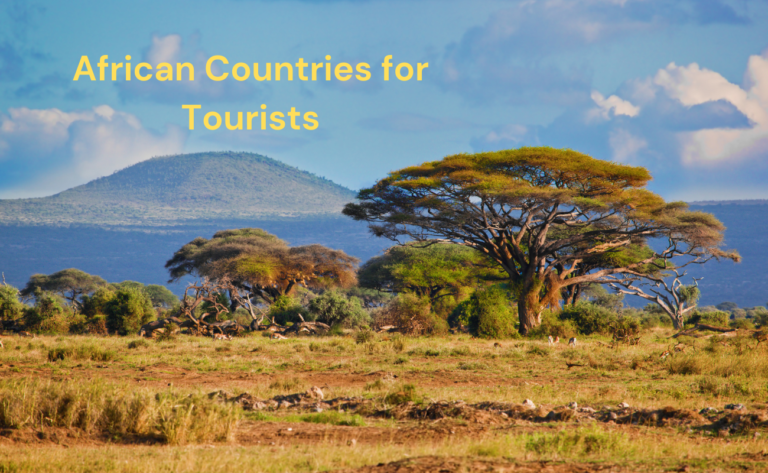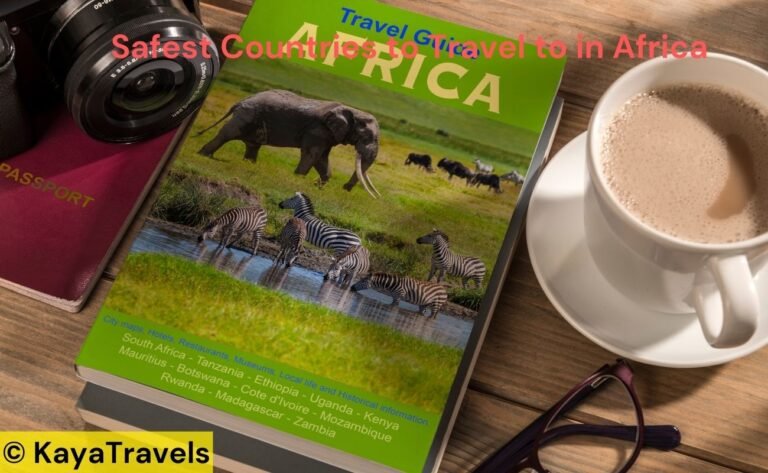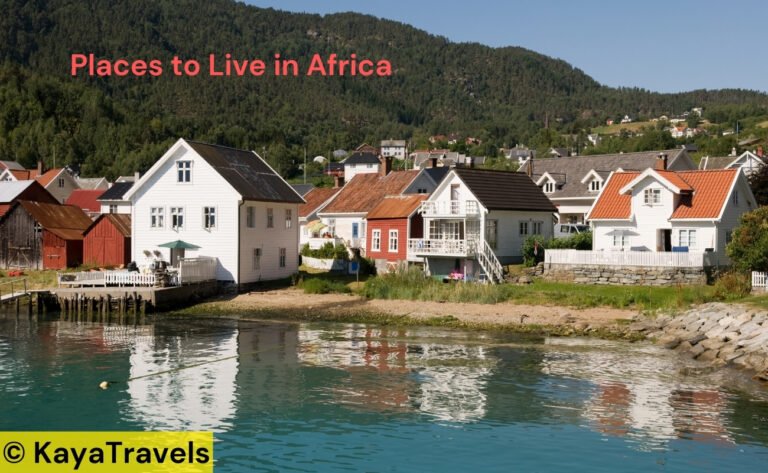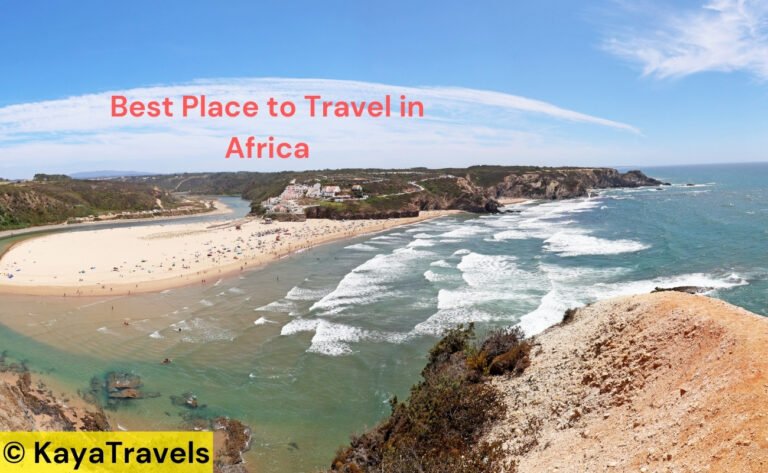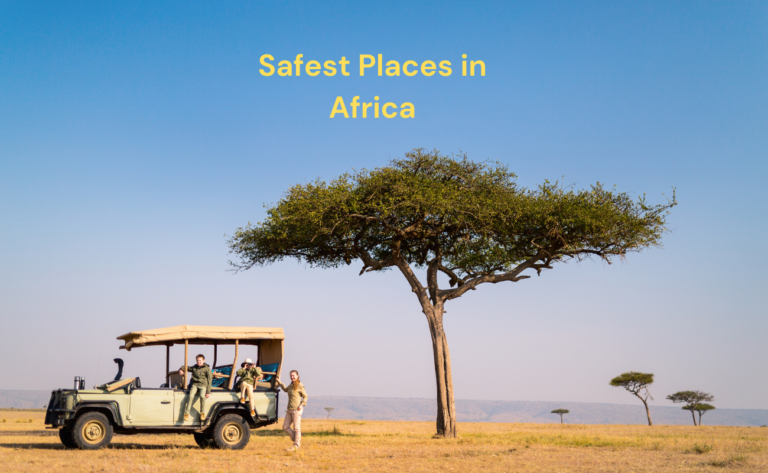Travelling to Africa is like stepping into the pages of a rich, layered, and thoroughly gripping history book brimming with heart-stirring tales and timeless landscapes. Your heart may skip a beat at first sight of a majestic lion in the wild, or you might find your pulse quickening at the mesmerizing rhythm of tribal drumbeats.
So whether you’re planning a safari extravaganza, a cultural immersion, or a sun-soaked beach escapade, Africa is a destination that will invariably leave you yearning for more.
Excellent, now you’re thinking of soaking in the ‘African experience’, but with a landmass spanning over 30 million square kilometres, where does one begin? Africa is a treasure trove of secrets and peculiarities waiting to be unearthed, so come along, let’s evaluate those possibilities together.
As you journey into the Mother Continent’s heart, this guide is dedicated to unveiling the most tantalizing African secrets and must-visit destinations.
Africa is an open book with numerous unwritten chapters, allowing every visitor to compose their unique tale of adventure and discovery. No two journeys are ever identical, providing a truly personalized expedition into its enchanting realms.
Through this article, we hope to entice you with exciting tales of hidden marvels, historical hubs, mystical traditions, and everything else ready to prepare for an extraordinary journey shaped by the continent’s immense biodiversity, incredibly vibrant cultures, and awe-inspiring vistas whether you’re a seasoned globetrotter or a passionate armchair travel devotee, for the African adventure of a lifetime!
| Country | Key Attractions | Less known African Secrets |
| South Africa | Cape Town, Kruger National Park, Johannesburg | Traditional health practitioners (THPs) outnumber conventional doctors. The rich local flora offers an array of medicinal plants. |
| Congo | Virunga National Park, Congo River, Kinshasa | The Congo basin holds an abundance of African biodiversity, contributing to a vast materia medica. |
| Tanzania | Serengeti National Park, Kilimanjaro National Park | Possesses a rich heritage of traditional medicine backed by remarkable flora. |
| Madagascar | Ranomafana National Park, Isalo National Park, Avenue of the Baobabs | Home to unique wildlife and plant species, many of which are believed to have medicinal properties. |
| Zambia | Victoria Falls, Lower Zambezi National Park | It boasts a deep rIt. It boasts tradition in natural healing, using the region’s rich biodiversity. |
What are some offbeat travel destinations in Africa?
| Country | Offbeat Destination | Unique Attraction |
|---|---|---|
| South Africa | The Drakensberg | Mountain trails and ancient rock art |
| Kenya | Lamu Island | Historic Swahili architecture and serene beaches |
| Tanzania | Selous Game Reserve | One of the largest faunal reserves in the world |
| Congo | Kahuzi-Biega National Park | Home of the Eastern Lowland Gorilla |
| Zambia | The Bangweulu Wetlands | Unique birdlife and annual floodplains |
| Ghana | Mole National Park | Diversity of wildlife and guided walking tours |
| Burkina Faso | The Ruins of Loropéni | Ancient and mystical archaeological site |
| Madagascar | The Avenue of the Baobabs | Majestic baobab trees lining a dirt road |
| Uganda | The Karamojong | Experience unique cultures and traditions |
What are the lesser-known African destinations for unique travel experiences?
If you long for untrodden paths and offbeat experiences, Africa is an undiscovered treasure trove. There’s an extraordinary range of less-travelled places waiting for your adventurous spirit. Allow me to guide you through a few of these mesmerizing locales.
Take a moment to picture the swoop of majestic flamingos over Lake Natron in Tanzania or the vibrant sight of Ghana’s lesser-known village festivals. Imagine witnessing the unknown beauty of Makgadikgadi Pan in Botswana, which turns into a miraculous wonderland of flamingos and zebras during the rainy season. Or, perhaps you’d prefer the mesmerizing forests of Congo’s Odzala-Kokoua National Park – a pristine paradise for primate enthusiasts.
Have you ever heard of Burkina Faso’s Sindou Peaks? These surreal geological formations create a maze of rocky cones and spires, an unparalleled aesthetic experience. The unspoiled wilderness of Zambia’s Lower Zambezi National Park merits a visit if you seek to see Africa’s big-game wildlife amidst an untouched landscape.
Next, consider Nigeria’s understated beauty of Idanre Hills, an ancient and spectacularly beautiful landscape steeped in local myths, or South Africa’s Namaqualand – come spring, it transforms into a sprawling canvas of wildflowers, painting the landscape with vibrant colours.
Lastly, let’s not forget the remote reaches of Kenya’s Lake Turkana, where you can witness some of the world’s most ancient archaeological sites in an otherworldly setting. Each of these lesser-known destinations holds a unique charm, capable of delivering an African travel experience that will leave you awestruck and longing for more.
What makes African travel unique?
| Unique Aspect | Description |
| Geographical Diversity | Africa spans all four hemispheres, presenting an unmatched geographical and climatic diversity, from deserts to rainforests. |
| Cultural Diversity | With over 50 sovereign nations, Africa boasts a rich cultural diversity, each with unique traditions, languages, and customs. |
| Traditional Medicine Practices | Illness in Africa is often viewed differently from Western allopathic medicine. Traditional practices, which consider physical, spiritual, moral, and social aspects of human beings, are deep-rooted and usually more accessible to locals. |
| Biodiversity | Africa’s high biodiversity contributes to the continent’s rich ‘materia medica’, with thousands of plant species believed to have medicinal properties. |
What is the best time to visit offbeat destinations in Africa?
| Destination | Best Time to Visit |
|---|---|
| South Africa | May to September |
| Kenya | June to October, January to February |
| Congo | June to September |
| Zambia | May to November |
| Tanzania | June to October, January to February |
| Uganda | December to February, June to August |
| Ghana | November to April |
| Madagascar | April to December |
| Burkina Faso | November to February |
How safe are the offbeat travel destinations in Africa?
Thinking about safety is paramount when travelling to any foreign destination, and offbeat locations in Africa are no exception to this rule. Like any other continent, Africa boasts places with a spectrum of safety standards. Contextual knowledge of your destination is imperative, so let’s look closer.
South Africa, noticed for its vibrant cities and stunning landscapes, has long addressed safety concerns, becoming one of Africa’s most frequented countries. While cities still experience crime-related issues, the tourist areas are generally secure and patrolled regularly.
Similar narratives can be echoed in Kenya and Uganda. These East African nations are becoming popular due to their unique wildlife, landscapes, and cultural blend. While areas of high crime rates exist within these nations, the regions preferred by travellers are often well-protected and policed.
Then we have the likes of Tanzania and Zambia, where tourists can expect a warm welcome. These countries have relatively low crime rates. However, it’s recommended to remain vigilant, particularly while visiting crowded areas or travelling at night.
For the adventurous at heart, the Congo might appear particularly enticing with its deep forests and intriguing culture. Nonetheless, the country has a tumultuous history, and certain regions can be riskier. Consult with travel advisories and only venture with accredited guides and tour operators.
Every country on the continent, be it Burkina Faso or Madagascar, has its share of risks and rewards. The key to a safe experience is thorough preparation and alertness during travel. Constantly have updated information about the safety conditions of your chosen destinations. Rest assured, with responsible travel behaviour, Africa is very much a destination that can be experienced safely and memorably.
What is the cost of travelling to hidden gems in Africa?
Travelling to Africa’s hidden gems isn’t necessarily as expensive as one might imagine. The total expense one incurs includes flights, accommodations, food, transport within the area, and costs of activities and entry fees. Here’s a brief overview to give you a clearer picture:
Flights: It usually forms the bulk of your budget. The cost can vary widely, depending on your originating location and the number of connections you may have. Check for discounted rates during off-peak seasons.
Accommodations: Lodging in these lesser-known destinations ranges from budget hostels to luxury resorts. For example, in places like Congo and Uganda, you can find budget accommodations for as low as £15 a night, while upscale lodgings might cost you anywhere between £70 and £150 per night.
Food: One can relish local cuisine at a very reasonable cost. Backpacker-friendly eateries or street foods in countries like Ghana or Tanzania might set you back only £1-£3 per meal. Midrange restaurants would typically cost between £5-£10.
Transport: Public transport like buses or shared taxis is usually quite affordable, costing around £1-£3 per journey within the city in countries like Kenya or Burkina Faso.
Activities and Entry Fees: This would largely depend on your interests. Safari parks, for example, have entrance fees ranging from £20 to £100, depending on the park or tour operator. Visits to cultural sights or museums typically have an entry fee of £1 – £5.
It’s important to remember that these are average costs and can fluctuate based on season, demand and changing exchange rates. Also, don’t forget to add extras such as travel insurance, vaccinations, and any required visas when budgeting. Consider also bringing some extra money for souvenirs or unexpected expenses.
In essence, travelling to unseen corners of Africa offers an enriching experience that doesn’t always have to break the bank.
What are some cultural insights to know before travelling to offbeat African destinations?
| Region | Unique Cultural Insight | Impact on Travel |
| South Africa | The tradition of Abandzawo belief in foreign or alien spirits calls individuals to become traditional healers. | Increases understanding of South African spiritual traditions & local customs. |
| Various parts of Africa | Traditional healers hold knowledge of medicinal plant species and preparations. | Enhances appreciation of local natural resources and ancient wisdom. |
| South Africa | Increase in sensitivity towards traditional healers’ issues | Raises awareness about the importance of conventional practitioners in local healthcare. |
| Various parts of Africa | Educating Africans about Western medicine alongside traditional healing practices. | Promotes balanced understanding and respect for both traditional and modern medical practices. |
| Southern Africa | Ngoma rituals intertwine cultural and religious beliefs holistically. | Exposes vibrant traditions, techniques and ceremonies, adding richness to the travel experience. |
What are the must-try local cuisines in these lesser-known African destinations?
Before venturing to these unconventional African locales, you might be curious about the tantalizing flavours that await your palette. Let’s plate up some of the must-try local cuisines you will find.
South Africa: South African cuisine is a vibrant mix of local and international flavours. A must-try traditional meal is ‘Bobotie’, a spiced and baked minced meat dish topped with an egg-based custard. You can’t say you’ve been to South Africa without trying this staple treat.
Kenya: In Kenya, one popular local dish stands out above the rest – Ugali na Sukuma. This dish boasts a hearty cornmeal porridge (Ugali) and a generous collard greens (Sukuma) serving. It’s a local staple food often paired with roasted meat or fish.
Burkina Faso: Riz Gras, or ‘Fat Rice’, is a beloved delicacy of Burkina Faso. The dish involves cooking rice in a rich tomato sauce, often with meat, making it a unique, flavourful spectacle in every bite.
Tanzania: Tanzanian cuisine offers a variety of mouth-watering flavours. The must-try is Ugali, a cornmeal staple served with different sauces and is even better when paired with Nyama Choma, a tantalizing roast meat dish.
Ghana: Fufu and Soup stands at the heart of Ghanaian gastronomy. A method adapted from the Akan ethnic group, Fufu, serves a dough-like substance with various soups, each teeming with flavour and texture.
Zambia: Here, nshima is a staple, often served with various sides like vegetables, meat or pickled fish. This stiff cornmeal porridge is an incredible way to experience local gastronomy.
Congo: Speaking of Congo, you must try Poulet à la Moamba. The national dish is a chicken stew made with Moambe, or Palm butter, and flavoured with red palm oil. It’s a rich and hearty meal that will leave you wanting more.
Thus, immersing yourself in these local cuisines is a fantastic way to learn about these lesser-known African destinations’ diverse cultures and life experiences.
What wildlife can I expect to see in these lesser-known African destinations?
| Destination | Typical Wildlife |
| South Africa | Elephants, Lions, Zebras, Leopards, Rhinos (The Big Five) |
| Kenya | Giraffes, Hippos, Flamingos, African Buffalo, White Rhinos |
| Zambia | Baboons, Buffalo, Hippos, Crocodiles, African Wild Dogs |
| Tanzania | Chimpanzees, Cheetahs, African Elephants, Bushbabies, Wildebeest |
| Congo | Gorillas, Bonobos, Okapis, Tamarins, African Grey Parrots |
| Madagascar | Lemurs, Fossa, Tenrecs, Chameleons, Tomato Frogs |
| Guinea | Pygmy Hippos, African Rock Pythons, Olive Baboons, Red River Hogs, Diana Monkeys |
| Uganda | Mountain Gorillas, Chimpanzees, Nile Crocodiles, Africian Buffalo, Hippos |
| Burkina Faso | African Lions, Leopards, Cheetahs, Hyenas, African Painted Dogs |
What are some common travel mistakes to avoid in Africa?
Navigating the vibrant landscapes of Africa may be daunting, especially for first-time visitors. However, you can ensure a safe and fulfilling journey by steering clear of some common mistakes. Here’s a rundown of what to avoid:
Disregarding Local Customs
Africa is rich in cultural diversity, with each region having unique traditions and customs. Respecting these cultural norms is essential to maintain harmony with the locals. For example, in Zambia, there are over 72 ethnic groups, each with unique treatment methods and practices, such as drinking, eating, and bathing, which newcomers should be mindful of.
Falling Prey to Fraudulent Practitioners
While in South Africa, be cautious of bogus ‘Sangomas’ or traditional healers. These practitioners are a crucial part of the local healthcare system, but fraudulent individuals have been known to exploit unsuspecting tourists. Always exercise caution.
Ignoring Health Advisories
Healthcare systems in many African countries, such as Congo or Tanzania, are still developing and have faced significant challenges during recent health crises like COVID-19. Don’t neglect health advisories – ensure you have travel insurance, pack essential medications, stay hydrated, and take necessary vaccinations before departure.
Overlooking Volunteer Opportunities
One of the most rewarding aspects of travelling in Africa is the opportunity to contribute to local communities. In countries like Kenya, myriad volunteer programs enable you to make a meaningful impact. Missing out on these chances to engage with the local culture on a deeper level is a mistake.
What kind of accommodation is available in these hidden African gems?
| Destination | Type of Accommodation | Additional Information |
|---|---|---|
| South Africa | Luxury resorts, Lodges, B&Bs, Camping sites | Accommodations can range from luxury resorts in cities like Cape Town to camping sites in Kruger National Park |
| Kenya | Safari lodges, Tented camps, Holiday villas | In Kenya, staying in a safari lodge or a tented camp can give you an authentic wildlife experience |
| Zambia | Riverside lodges, Safari camps, Guest houses | Zambia offers unique riverside lodges and safari camps, particularly near the Victoria Falls |
| Tanzania | Safari lodges, Beach resorts, Guest houses, Camping sites | You can stay in Tanzania at a Zanzibar beach resort or a Serengeti safari lodge. |
What travel documents do I need to travel to offbeat destinations in Africa?
To embark on your African adventure, it’s essential to have the necessary travel documentation organized well in advance. Regardless of where in Africa you’re travelling to, a valid passport with at least six months of validity remaining from your planned date of departure is a universal requirement. The passport should also have at least two blank visa pages for entry and exit stamps.
Visa requirements for African countries can vary greatly and change periodically, so thorough research is critical. Some countries ask for visas to be organized in advance, whereas others, such as Madagascar and Kenya, offer visas on arrival for certain nationalities. Always cross-check with the official consulate or embassy websites to avoid travel hiccups.
Furthermore, if you’re planning to drive in some parts of Africa, such as South Africa or Uganda, an International Driving Permit alongside your valid driving license from your home country may be necessary. Also, for those venturing to offbeat destinations with local flights involved, certain internal airlines might require carrying a copy of your passport.
Health documents should not be overlooked either. Proof of Yellow Fever vaccination is mandatory for entry into numerous African countries, including Zambia and Congo. It may also be advisable to keep your Covid-19 vaccination certificate as more and more countries are asking for this as part of their entry requirements.
Lastly, remember to have comprehensive travel insurance that covers any unexpected incidents. Not only is this good practice for safe travel, but certain African countries may require proof of insurance upon entrance. Travel documentation may seem arduous, but it’s essential to ensuring your African adventure is safe and memorable.
What are some must-have items to pack for an offbeat African adventure?
| Items | Description |
| Lightweight Clothing | African climates can be scorching, so lightweight, breathable clothing is essential. |
| Mosquito Repellent | Have a good supply of mosquito repellent to prevent malaria, especially in rural areas. |
| Water Purification Tablets | Safe drinking water might not always be available; these are critical to prevent waterborne diseases. |
| First Aid Kit | A properly equipped first aid kit is essential for handling minor injuries. |
| Sunscreen | High-quality sunscreen is necessary to protect your skin from the powerful African sun. |
| Camera and Binoculars | For capturing all the unforgettable moments and views. Don’t forget extra batteries or a power bank. |
| Travel Guidebook and Maps | Provide helpful information on local attractions and travel tips; maps help you navigate the area. |
| Adapters for Electrical Items | Electricity supply and socket types vary across Africa; check in advance for the nations you will be visiting. |
| Phrasebook or Translation App | While English is commonly spoken in many parts of Africa, phrasebooks or translation apps can assist in interacting with locals, especially in offbeat destinations. |
| Hand Sanitizers and Wipes | We maintain hygiene on the go, particularly when travelling through remote or rural areas with limited facilities. |
Can I volunteer or contribute to local communities while travelling in Africa?
Without a doubt, the answer is an emphatic yes. Volunteering or contributing to local communities is a narrative closely interwoven into the rich tapestry of authentic African travel experiences. It’s an opportunity that allows you to engage on a deeper level with the local culture and people — an intrinsically rewarding venture that goes beyond the conventional travel norm. Importantly, it offers a chance to make a difference in the communities you visit and enrich your life.
Several African programs and organizations welcome travellers eager to volunteer during their adventure. The options are plentiful, from education and health care initiatives to wildlife conservation endeavours. For instance, in South Africa, traditional medical practitioners play a critical role in national health care, particularly in the context of HIV/AIDS prevention and care. As a volunteer, you could be part of public health initiatives collaborating with these practitioners, known as sangomas, to combat HIV/AIDS, diarrhoea, and pneumonia in rural areas.
Moving northwards to Zambia, there’s a chance to embark on an immersive educational journey. Volunteers here can actively participate in community-based projects, helping to improve educational infrastructures or teaching children.
Similarly, volunteering in Kenya, Tanzania, and Burkina Faso can take on an environmental slant, with exciting projects focused on wildlife conservation and reforestation. Given Africa’s vast biodiversity, these efforts are crucial in preserving its natural environment for future generations.
No matter the country or volunteer task, remember to approach all interactions with sensitivity and respect for local customs and cultures. Conducting yourself with a learning attitude and a willingness to understand the local way of life should be your guiding principles.
Finally, remember to ensure any volunteering aligns with sustainable and ethical practices. Look into the organizations facilitating these experiences to ensure they positively impact the local communities and are responsibly managed.
W weaving volunteer work into your African adventure can be transformative, adding another layer of depth, understanding, and connection to your journey.

